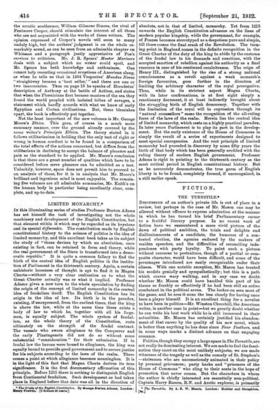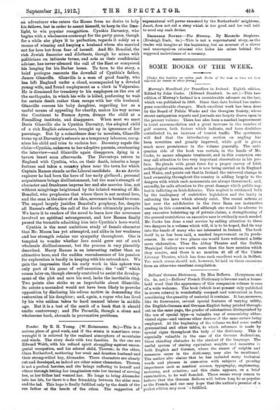FICTION.
THE TURNSTILE.*
Discussiox of an author's private life is out of place in a review, but perhaps in the case of Mr. Mason one may be allowed without offence to express admiration at the manner in which he has turned his brief Parliamentary career to a fruitful literary purpose. In no recent work of fiction have we encountered a more vivid picture of the dawn of political ambition, the trials and delights and disillusionments of a candidate, the humours of a con- tested election, the agonies endured by the makers of maiden speeches, and the difficulties of reconciling inde- pendence with party loyalty. To paint such a picture without recourse to portraiture, though of a partial or com- posite character, would have been difficult, and some of the personages introduced are easily recognizable under their aliases. With one notable exception, Mr. Mason has treated his models genially and sympathetically; but this is a path which craves wary walking, and in any case we doubt whether Mr. Mason could have handled this part of his: theme so frankly or effectively if he had been still an active combatant in the political arena. The looker-on sees most of the game, and he sees it none the less clearly for having once- been a player himself. It is an excellent thing for a novelist to have been in politics—Mr. Winston Churchill, the American writer, is another case in point—but we greatly doubt whether he can write his best work while he is still immersed in their actualities. Mr. Mason has certainly justified his abandon- ment of that career by the quality of his new novel, which is better than anything he has done since Four Feathers, and in some ways marks a distinct advance on that engaging romance.
Politics, though they occupy a large space in The Turnstile, are not really its dominating interest. We are made to feel the fasci- nation they exert on the most unlikely subjects; we are made witnesses of the tragedy as well as the comedy of St. Stephen's —statesmen who are unconsciously animated in their policy by personal grievances ; party hacks and "prisoners of the House of Commons" who cling to their seats in the hope of promotion that never comes. But the characters in whom the author is chiefly interested are essentially non-political. Captain Harry Rames, R.N. and Arctic explorer, is primarily
• The rernstSe. By A. E. W. Mason. London: Hodder and Stoughton. Pc]
an adventurer who enters the House from no desire to help his &allows, bat- in order to assert Isinuself, to keep in the lime- light, to win popular recognition. Cynthia Daventry, who begins with a wholesome contempt for the party game, though for a while she plays 'it to perfection, -regards it solely as a means of winning and keeping a husband whom she married. not for love but from fear of herself. And Mr. Benoliel, the rich Jewish financier and dilettante, though he mixes with politicians on intimate terms, and acts as their confidential adviser, has-never silenced the call of the East or conquered his longing for his Berber home. To turn to the story, a brief prologue xecounts the downfall of Cynthia's father, James Glanville. Glanville is a man of good family, who has left England under a cloud, accompanied by a devoted young wife, and found employment as a clerk in Valparaiso. He is dismissed for treachery to his employers on the eve of the earthquake, in which his wife is killed, preferring to wait. for certain -death rather than escape with her vile husband. Glanville rescues his baby daughter, regarding her as a useful means of appealing for charity, makes his way across the Continent to Buenos Ayres, dumps the child at a oundling institute, and disappears. When next we meet Doris Glanville she is Cynthia Daventiy, the adopted child of a rich English cstanciero, brought up in ignorance of her parentage. But by a coineidenee dear to novelists, Glanville, turns up olDaventay's estancia as a temporary labourer, recog- nizes his child and tries to reclaim her. Daventry repels the claim—Cynthial unknown to her-adoptive parents, overhearing the interview—and Glanville again disappears, dying in a tavern brawl soon afterwards. The Daventrys return to England with Cynthia, who, on their death, inherits a large fortune and takes a country place near the town for which Captain Barnes stands as the. Liberal candidate. As an Arctic explorer he had been the hero of her early girlhood ; personal acquaintance brings disillusionment, but the man's strength of character and frankness impress her and she marries him, not without misgivings.heightened by the belated warning of Mr. Benoliel, who prophesies that where there is not mutual love, and the man is the slave-of an idea, severance is bound to come. The sequel largely justifies Beneliel's prophecy, for, despite all Rames's.efforts, the call of the Arctic ultimately:prevails. We leave it to readers of the novel to learn how the severance involved no spiritual estrangement, and how Ramea finally passed the turnstile admitting him into Cynthia's hero-world.
Cynthia is the most ambitious study of female character that Mr. Mason has; yet attempted, and alike-in her-weakness and her strength retains our sympathy throughout. One is tempted to wonder whether love could grow out of such Wholesale disillusionment, but the process is very plausibly described. Harry Raines is an interesting rather than an attractive hero, and the sudden recrudescence of his passion for exploration is hardly in keeping with his antecedents. We gain the impression that his early work in this sphere was only part of his game of self-assertion ; tine " ce3Cr which comes later on,-though cleverly contrived to assist-the develop- ment of the plot and save his soul, lacks the inevitable ring. Two points also strike us as improbable about Glanville. So astute a-scoundrel would not have been likely -to provoke opposition by disclosing his odious motive in demanding the restoration of his daughter ; and, again, a rogue who has lived by his wits seldom takes to hard manual labour in middle age. But it is a test of the merit of a book that it should excite controversy; and The Turnstas, though a. clean and wholesome book, abounds in provocative problems.











































 Previous page
Previous page